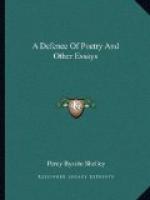Nothing is more clear than that the infliction of punishment in general, in a degree which the reformation and the restraint of those who transgress the laws does not render indispensable, and none more than death, confirms all the inhuman and unsocial impulses of men. It is almost a proverbial remark, that those nations in which the penal code has been particularly mild, have been distinguished from all others by the rarity of crime. But the example is to be admitted to be equivocal. A more decisive argument is afforded by a consideration of the universal connexion of ferocity of manners, and a contempt of social ties, with the contempt of human life. Governments which derive their institutions from the existence of circumstances of barbarism and violence, with some rare exceptions perhaps, are bloody in proportion as they are despotic, and form the manners of their subjects to a sympathy with their own spirit.
The spectators who feel no abhorrence at a public execution, but rather a self-applauding superiority, and a sense of gratified indignation, are surely excited to the most inauspicious emotions. The first reflection of such a one is the sense of his own internal and actual worth, as preferable to that of the victim, whom circumstances have led to destruction. The meanest wretch is impressed with a sense of his own comparative merit. He is one of those on whom the tower of Siloam fell not—he is such a one as Jesus Christ found not in all Samaria, who, in his own soul, throws the first stone at the woman taken in adultery. The popular religion of the country takes its designation from that illustrious person whose beautiful sentiment I have quoted. Any one who has stript from the doctrines of this person the veil of familiarity, will perceive how adverse their spirit is to feelings of this nature.
SPECULATIONS ON METAPHYSICS
I—THE MIND
It is an axiom in mental philosophy, that we can think of nothing which we have not perceived. When I say that we can think of nothing, I mean, we can imagine nothing, we can reason of nothing, we can remember nothing, we can foresee nothing. The most astonishing combinations of poetry, the subtlest deductions of logic and mathematics, are no other than combinations which the intellect makes of sensations according to its own laws. A catalogue of all the thoughts of the mind, and of all their possible modifications, is a cyclopedic history of the universe.
But, it will be objected, the inhabitants of the various planets of this and other solar systems; and the existence of a Power bearing the same relation to all that we perceive and are, as what we call a cause does to what we call effect, were never subjects of sensation, and yet the laws of mind almost universally suggest, according to the various disposition of each, a conjecture, a persuasion, or a conviction of their existence. The reply is simple; these thoughts are also to be included in the catalogue of existence; they are modes in which thoughts are combined; the objection only adds force to the conclusion, that beyond the limits of perception and thought nothing can exist.




